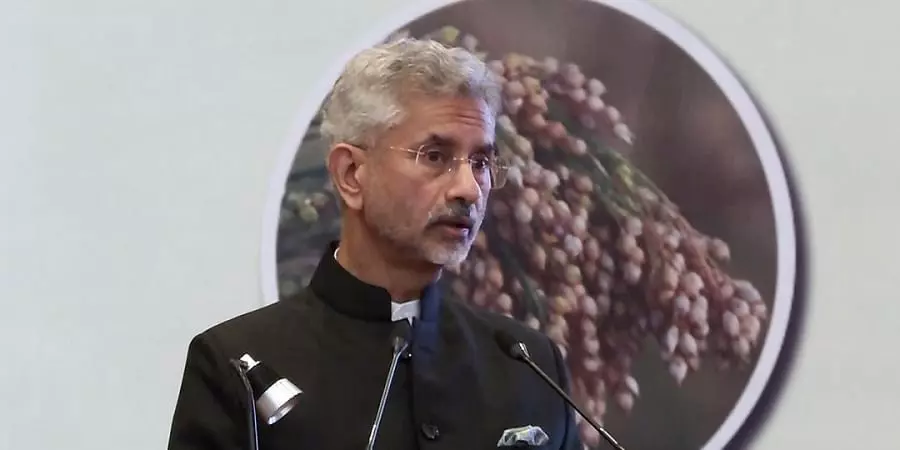
Jaishankar advocates push for millets; says food security impacted by Covid, climate, conflict
text_fieldsNew Delhi: The three Cs—climate change, Covid-19, and conflict—are all having an impact on food security, according to External Affairs Minister S. Jaishankar, who today called for a concentrated worldwide push for millets.
Millets are grown in 130 countries, including India, and the minister claimed that a concentrated effort by these nations to increase millets' availability will improve food security, increase their level of independence, and expand their reach globally.
Speaking at a pre-launch celebration of 2023 as the International Year of Millets, the minister shared how each of the 3Cs has impacted food security putting the global economy at risk due to the concentration of production centres and trade disruption.
He said de-risking the global economy requires more decentralised production and more self-reliance as well as "willingness" on part of the country not only to grow for themselves but to help each other.
Against this backdrop, the minister asked High Commissioners and Ambassadors to India to give much greater attention to food security and think of millets from the point of view of international relations apart from its nutritional, production and climate benefits.
Agriculture Minister Narendra Singh Tomar, Minister of State for Agriculture Shobha Karandlaje, Minister of State for External Affairs Meenakshi Lekhi and Agriculture Secretary Manoj Ahuja were present at the event.
"Look at the state of the world. I would like you to reflect on the relevance of millets to that. If there are three big challenges which we have experienced and continue to experience. They are to my mind 3Cs: Covid, Conflict, and Climate. Each one of them in some way has impacted food security," Jaishankar said.
He suggested that in international relations, every country should be giving "much greater attention to food security" and looking for more resources, diversity, production, and a reliable and resilient supply chain.
"If there is today a concentrated global push of millets grown in 130 countries, what you will see (is) these 130 countries will surely enhance their own self-reliance and food security," he said. In the process, they will actually contribute to a larger amount of foodgrains which will be available for global consumption, he added.
He said millet-growing nations should not only think purely of nutritional or agricultural exercise or something which will improve farmers' income, which is extremely important but do also think of larger implications, greater protection of more diversity of food which has other virtues. Sharing the impact of 3Cs on food security, Jaishankar said concentrated production centres and trade disruptions affect the global economy, PTI reported.
The Covid-19 period reminded us of what the pandemic would do to food security. "I think this was not the first pandemic and I am sure this will not be the last one. ...I think there will be a future pandemic. How do we prepare for food security implications if there are future pandemics," he said.
The conflict in Ukraine, the leading global wheat exporter, led to an escalation in global food prices, speculation, and shortages. There are also growing concerns of climate change that can lower production but also disrupt trade, he said.
"If you put Covid, conflict and climate, I would suggest, perhaps in international relations, we should all be giving much greater attention to food security," he added.
"As we look at the world today, de-risking the global economy requires more decentralised production, more self-reliance. It certainly requires a willingness on part of the country not only to grow for themselves but to help each other," he said adding that this is the message of the international year of millet.
Highlighting steps taken to boost millet production and value-added products, the Agriculture Minister said India, the world's largest millet-producing nation, raised domestic production from 13.17 million tonnes in the 2018-19 crop year (July-June) to record 18 million tonnes in 2021-22 crop year.
Considering the nutritional value of millets, millets were notified as Nutri-cereal in 2018. It has also been included in the Poshan Mission campaign.
Besides, India has more than 500 start-ups in the millet value additional food chain. The government's Indian Institute of Millets Research has incubated 250 startups. More than 66 start-ups have been given funds of ₹ 62.3 million, while five startups have been approved for further funding, he said.
Think-tank Niti Aayog and World Food Programme are focusing on mainstreaming the millets, he added. Around 100 High Commissioners and Ambassadors to India present at the event tasted global recipes made of millet at lunch organised at Sushma Swaraj Bhawan here.























